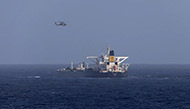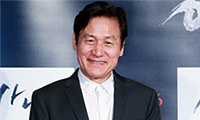▶ In Earnest
My office was in one of the buildings in Kyongbok Palace. My workload was heavy and the salary meager, so I had several side jobs to augment my income to support my family.
Still I liked my job there because I could meet some interesting people both Koreans and Americans. And, during lunch hour I could take a leisurely walk around the lotus pond by the Kyong Hoe Ru (Pavilion) Building with friends, both American and Korean.
The first spring after the liberation was one of the most beautiful springs for me. I used to spend my lunch hour in the palace where violets, dandelions and cherry blossoms were in bloom.
One afternoon, when I returned to my office from my mid-day walk, I saw a young man about 20 sitting in front of my desk, waiting for me.
When he saw me, he stood up and said to me, "How are you, sir? I am Bin."
Though I hadn? seen him for two years, I recognized him immediately. He was one of the top students in the high school where I had taught. Bin had excelled in English and music.
After a brief conversation, I asked him if he wanted a job in our office. He nodded. I introduced Bin to the section chief, who gave Bin a job like mine, right then and there.
He was even allowed to attend Seoul National University half a day.
A few months after that I quit my job to return to teaching full-time, but Bin remained. And subsequently, he was chosen as one of the students, sponsored by the government to study at a prestigious university in the United States.
When Bin earned his degree, he was promised a job as a section chief in an important department in the government. On his way home, he stopped in Tokyo where I was working at the time.
As he was a brilliant person, I was going to recommend him for a well-paying job in Tokyo, but he told me he wasn? interested. "If I go home, my monthly salary will be the equivalent of $4 but I am going to take the job in our government," Bin said. I was impressed.
Several years passed and I remained in Tokyo. One day, I received a telephone call from Bin. He said he was visiting Tokyo on official business. I promptly drove to the hotel where he was staying. Bin said he was still the section chief in the same department. He also said he would be happy if he could be promoted to the position of bureau chief.
Not long after our conversation, there was a student revolution and a year later, the military took over the government.
Bin was promoted to the bureau chief position that he had coveted for so long. Within months, he got another promotion?his time to the position of deputy minister. Subsequently, he was sent to Europe as a minister, then was promoted to rank of ambassador.
As he was fluent in many languages, including French, German and Italian, he was most suited for those diplomatic posts.
One day, Bin resigned from his job as ambassador and came back to Korea. Shortly after his return, he was invited by a university to become its president. He did a good job there for several years.
Just a few years back, he became a cabinet member. While his tenure as a cabinet member was short, I think he did a good job.
I certainly can? think of many talented Koreans, who have performed important service for the Korean government almost continuously since 1945.
A man who takes a $4-a-month job, when he could get a job paying 100 times that salary, is no ordinary man.
스마터리빙
more [ 건강]
[ 건강]이제 혈관 건강도 챙기자!
[현대해운]우리 눈에 보이지 않기 때문에 혈관 건강을 챙기는 것은 결코 쉽지 않은데요. 여러분은 혈관 건강을 유지하기 위해 어떤 노력을 하시나요?
 [ 건강]
[ 건강]내 몸이 건강해지는 과일궁합
 [ 라이프]
[ 라이프]벌레야 물럿거라! 천연 해충제 만들기
 [ 건강]
[ 건강]혈압 낮추는데 좋은 식품
[현대해운]혈관 건강은 주로 노화가 진행되면서 지켜야 할 문제라고 인식되어 왔습니다. 최근 생활 패턴과 식생활의 변화로 혈관의 노화 진행이 빨라지고
사람·사람들
more많이 본 기사
- 폭설 속 산행 비극… 마운트 볼디서 3명 조난 사망
- 안성기, 1월 1일 생일 하루 앞두고 심정지 상태 병원 이송..쏟아지는 응원
- “10년간 모든 이민 전면 금지?” 황당 주장
- ‘故장제원 아들’ 노엘 “구치소서 58kg→95kg” 모습 보니
- 가주 판매 간 소고기 ‘이콜라이’ 오염
- LA 북쪽 테혼 카지노서 하룻새 10만불 ‘연속 잭팟’
- [알림] 오늘 신년특집 발행, 연방 공휴일인 새해 1월1일자 신문은 발행되지 않습니다.
- ‘아듀~ 2025!’… 희망찬 새해로
- [연말 기획] 한국계 혼혈들 두각… 각 분야에서 ‘맹활약’
- 한국팀 뛸 곳인데… 강력범죄 ‘충격’
- 전남대 신년회
- 신년 연휴 폭풍우… 비 3인치 온다
- 원·달러 환율… 연평균 기준 ‘역대최고’ 마감
- ‘백두산 호랑이’ 대가족 포착… “매우 희귀한 일”
- “라면, 못 끊겠다면 ‘이거’라도 넣어라”
- 알고보니 ‘완전식품’인 고구마의 놀라운 효능
- ‘헤비급 복서’ 조슈아 구사일생 동승자 2명 사망사고에도 경상
- [연말 화제] 올해도 찾아온 ‘얼굴 없는 천사’
- “치매에 치즈가 좋대서 맨날 먹었는데”… 고지방 주의
- ‘케네디’가 또 비극 외손녀 희귀암 별세
- 문소리, 아이유 이어 강하늘 엄마 된다..영화 ‘국제시장2’ 합류
- 위너 송민호, 병역법 위반 혐의 불구속 기소
- 구리선 절도범 소행에 LA 교통 통신망 ‘먹통’
- 트럼프 이름 덧붙인 ‘케네디센터’ 공연 줄취소
- 내년 1월부터 달라지는 MD 법안들
- 샴페인, 마지막 날과 첫날을 위하여
- 트럼프 “베네수엘라 마약 싣는 항만 타격”… 첫 지상 공격
- 임영웅, 2025년에도 빛난 ‘히어로’..음악·예능·공연 모두 잡았다
- [조지 F. 윌 칼럼] 저무는 2025년에 안도의 한숨
- [인터뷰-문경환 한인회장] “캔자스, 이민자들에 제2의 기회의 땅”
- 우크라 ‘푸틴 관저 공격설’에 종전 기대감 찬물
- [미국은 지금] 책임 있는 자본 없으면 커뮤니티 미래도 없다
- “경기 둔화·샤핑패턴 변화 파고 못 넘어”
- 중국, 올해 신차판매 1위… 일본 ‘20년 아성’ 깼다
- [경제 트렌드] AI 열풍 속에 신흥 2030 억만장자 급증
- 오픈AI에 400억불 투자 소프트뱅크가 10% 지분
- [한인 은행장 신년사 통해 본 비전과 경영 목표] “끊임없는 변화와 혁신으로 안정적 성장 도모”
- 한동훈 “가족이 尹부부 비판 글 올린… 2
- “미군에 쫓기는 ‘유령선단’ 유조선, ‘러시아 국적’ 주장”
- 메트로카드, 31년만에 역사 속으로
- 사실상 고객 1인당 1만원… “생색내기 보상으로 불신만 키워”
- 단백질 늘리고 탄수화물 줄이고…영양소 적정 기준 개정
- [LA 일원 새해맞이 명소는] “웰컴 2026”… 남가주 새해맞이 행사 풍성
- 동포청 ‘재외동포 이해교육’ 실시
- 케이스쉴러 주택가격지수 상승
- 연방정부, 기업 채용·승진정책 조사
- [수요 에세이] 다시, 제자리로 돌아와서
- 명품의 힘… 현대백화점 판교점 연매출 2조 찍었다
- SI “김하성 영입은 A-” 수비력 유지·공격력 향상
- 이강인 뛰는 PSG, ‘2025 최고의 팀’
1/5지식톡

-
 미 육군 사관학교 West Poin…
0
미 육군 사관학교 West Poin…
0https://youtu.be/SxD8cEhNV6Q연락처:wpkapca@gmail.comJohn Choi: 714-716-6414West Point 합격증을 받으셨나요?미 육군사관학교 West Point 학부모 모…
-
 ☝️해외에서도 가능한 한국어 선생님…
0
☝️해외에서도 가능한 한국어 선생님…
0이 영상 하나면 충분합니다!♥️상담신청문의♥️☝️ 문의 폭주로 '선착순 상담'만 진행합니다.☎️ : 02-6213-9094✨카카오톡ID : @GOODEDU77 (@골뱅이 꼭 붙여주셔야합니다…
-
 테슬라 자동차 시트커버 장착
0
테슬라 자동차 시트커버 장착
0테슬라 시트커버, 사놓고 아직 못 씌우셨죠?장착이 생각보다 쉽지 않습니다.20년 경력 전문가에게 맡기세요 — 깔끔하고 딱 맞게 장착해드립니다!장착비용:앞좌석: $40뒷좌석: $60앞·뒷좌석 …
-
 식당용 부탄가스
0
식당용 부탄가스
0식당용 부탄가스 홀세일 합니다 로스앤젤레스 다운타운 픽업 가능 안녕 하세요?강아지 & 고양이 모든 애완동물 / 반려동물 식품 & 모든 애완동물/반려동물 관련 제품들 전문적으로 홀세일/취급하는 회사 입니다 100% …
-
 ACSL 국제 컴퓨터 과학 대회, …
0
ACSL 국제 컴퓨터 과학 대회, …
0웹사이트 : www.eduspot.co.kr 카카오톡 상담하기 : https://pf.kakao.com/_BEQWxb블로그 : https://blog.naver.com/eduspotmain안녕하세요, 에듀스팟입니다…
케이타운 1번가
오피니언
 정숙희 논설위원
정숙희 논설위원샴페인, 마지막 날과 첫날을 위하여
 조지 F·윌 워싱턴포스트 칼럼니스트
조지 F·윌 워싱턴포스트 칼럼니스트 [조지 F. 윌 칼럼] 저무는 2025년에 안도의 한숨
 김동찬 시민참여센터 대표
김동찬 시민참여센터 대표 [미국은 지금] 책임 있는 자본 없으면 커뮤니티 미래도 없다
 성영라 수필가 미주문협 부이사장
성영라 수필가 미주문협 부이사장 [수요 에세이] 다시, 제자리로 돌아와서
 신경립 / 서울경제 논설위원
신경립 / 서울경제 논설위원 [만화경] 경영자의 ‘문제적’ 사과
 문태기 OC지국장
문태기 OC지국장 한인 정치력 업그레이드 기대
 민경훈 논설위원
민경훈 논설위원세계 역사를 바꾼 동물
 박홍용 경제부 차장
박홍용 경제부 차장 한인사회가 주목해야 할 새해 경제
 박영실 시인·수필가
박영실 시인·수필가 [화요칼럼] 피드백
1/3지사별 뉴스

메트로카드, 31년만에 역사 속으로
1994년 처음 등장해 지난 31년간 뉴욕시 전철과 버스 승차권으로 쓰인 메트로카드가 31일을 끝으로 역사 속으로 사라진다. 더 이상 메트로카…
■ 사고- 한동대·뉴욕한인청소년센터 국제여름캠프

2025 워싱턴지역 10대 뉴스
다사다난했던 2025년이 하루만 남겨둔 채 역사의 저편으로 저물고 있다. 올해의 가장 큰 뉴스는 트럼프 2기 행정부 출범과 함께 몰아친 이민 …
내년 1월부터 달라지는 MD 법안들

셀폰 위치추적, 납치된 딸 살렸다… ‘부모 통제’ 기능 활용
스마트폰에서 자녀의 위치를 확인할 수 있는 ‘부모 통제(parent control)’ 위치 추적 기능의 도움으로 납치됐던 청소년들이 잇달아 구…
[새해부터 이렇게 달라진다] 최저임금 또 오르고… 유급 병가는 더 확대

오늘 하루 이 창 열지 않음 닫기 




















































.png)


댓글 안에 당신의 성숙함도 담아 주세요.
'오늘의 한마디'는 기사에 대하여 자신의 생각을 말하고 남의 생각을 들으며 서로 다양한 의견을 나누는 공간입니다. 그러나 간혹 불건전한 내용을 올리시는 분들이 계셔서 건전한 인터넷문화 정착을 위해 아래와 같은 운영원칙을 적용합니다.
자체 모니터링을 통해 아래에 해당하는 내용이 포함된 댓글이 발견되면 예고없이 삭제 조치를 하겠습니다.
불건전한 댓글을 올리거나, 이름에 비속어 및 상대방의 불쾌감을 주는 단어를 사용, 유명인 또는 특정 일반인을 사칭하는 경우 이용에 대한 차단 제재를 받을 수 있습니다. 차단될 경우, 일주일간 댓글을 달수 없게 됩니다.
명예훼손, 개인정보 유출, 욕설 등 법률에 위반되는 댓글은 관계 법령에 의거 민형사상 처벌을 받을 수 있으니 이용에 주의를 부탁드립니다.
Close
x